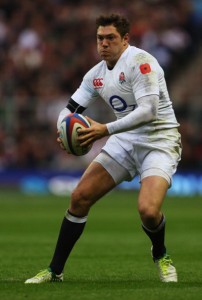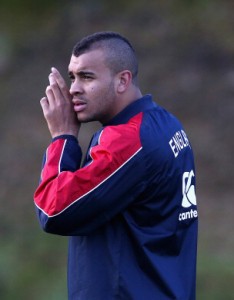
Sharp shooter: Charlie Sharples scored two tries on Saturday – but could have had more if England had been clinical
By Alex Lowe
ENGLAND’S OPENING QBE International against Fiji was always going to be a nicely-timed opportunity to blow off some cobwebs before the arrival of Australia, South Africa and New Zealand.
It is impossible to look at it in any other context. An England victory was inevitable and it is difficult, foolhardy even, to draw too many firm conclusions from this one performance as to whether Stuart Lancaster’s men are up to the standard required to test the world’s top three nations.
The England management have made no secret in the build-up to the autumn campaign of their desire to emulate world champions New Zealand – from the All Blacks’ ability to evolve as a team to their ruthlessness in attack, it is they who set the standards in the global game.
So would New Zealand have put 80 points on this below-strength Fiji side? They may well have, such is their ability to see an opportunity and take it. That is what England are aiming for and, judging by the Fiji performance, there is still a way to go on that front.
England scored seven tries but failed to convert a host of other opportunities. That ruthless execution is what Lancaster and his coaching team will be working on this week. They must expect to meet the Australia who drew 18-18 with New Zealand, not the Australia who were thumped by France on Saturday night.
England must also ensure this propensity to start slowly does not develop into a habit. Of course, England will find themselves on the defensive at times but to have been on the back foot for the best part of 20 minutes against Fiji was a concern. Better sides would have punished England in that opening quarter, as South Africa did on the summer tour.
But let’s not be too churlish. This was a decent first hit-out for an England side still in the foothills of its development and there were some obvious plus points.
Alex Goode for one. The Saracens full-back has brought a new dimension to England’s attacking game. He views the game in widescreen, like a fly-half, which makes him so effective when he joins the attack as England’s second playmaker.
Harlequins full-back Mike Brown has his obvious qualities – a rock at the back, a huge boot – but it is Goode who has the ability to transform England from predictable to a team with attacking potential.
As Goode himself said after the match, England’s Six Nations campaign was founded on tenacity, defence and a good kicking game. With Goode at full-back, England have the potential to ask questions of the best defences in the world for the first time in about a decade. The challenge now – and it is not an insignificant one given England have not managed it with consistency since 2003 – is to turn that potential into reality against the three best teams in the world.
I’d start Jonathan Joseph at outside-centre against the Wallabies and move Manu Tuilagi to 12. For all Brad Barritt’s commitment, Joseph is a more dangerous attacking prospect and I’d be excited to see him combine with Danny Care, Toby Flood, Tuilagi and Goode.
Charlie Sharples took his opportunity well in Chris Ashton’s absence, coming within an inch of a hat-trick on his first Twickenham start and he was lively off his wing.
Ashton will return to face the Wallabies and Lancaster’s choice is then between Sharples, also a natural right wing, or Ugo Monye. Both calls have their merits.
Tom Youngs enjoyed a rumbustious debut at hooker, although it was probably his easiest game of the season given Fiji barely contested any set-piece. Like England as a whole, this was a nice introduction to the increasingly tough challenges to come.
Follow Alex Lowe on Twitter @AlexMLowe







